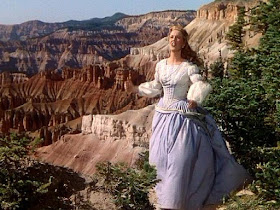 |
| Amanda and Tom: Gertrude Lawrence and Arthur Kennedy |
Faded Southern belle Amanda Wingfield (Gertrude Lawrence) is afraid that her son, Tom (Arthur Kennedy) will turn out like his father, who left the family many years before and was never heard from again. Amanda is even more worried about her daughter, Laura (Jane Wyman), who is lame, painfully shy, and perhaps has emotional disabilities as well. Amanda importunes Tom to bring a friend and co-worker, a "gentleman caller," named Jim (Kirk Douglas) to supper so he can meet and romance Laura, but things don't quite work out the way Amanda intended. The Glass Menagerie, based on Tennessee Williams' first play, which he in turn based on events and characters from his own life, has been a bit watered-down from the play and has a Hollywood [supposedly] "happy" ending, but it's still a very strong picture. Lawrence leads the cast with her excellent portrayal of a woman who is kind and loving but also, unfortunately, quite overbearing at times. As the alternate film version of Laura, Wyman [All That Heaven Allows] is very good, as is Douglas [The Brotherhood] as the upbeat and likable Jim. Arthur Kennedy [Claudelle Inglish] plays the role in a more robust and less sensitive style than other actors, but he is also quite good as Tom. Rapper's direction helps to intelligently open up the play, and there's an interesting encounter between Tom and a woman trying to pick him up in a bar. Max Steiner turned in a lovely and more subtle score than usual, generally letting the play speak for itself.
Verdict: Quite nice indeed. ***1/2.



























